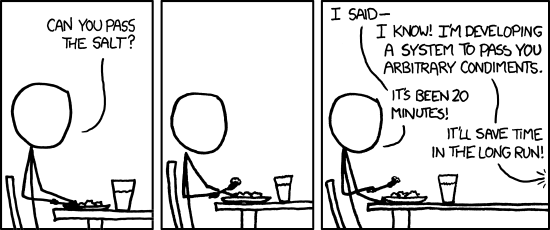gpio-watch: Run scripts in response to GPIO signals
For a small project I’m working on I needed to attach a few buttons to a Raspberry Pi and have some code execute in response to the button presses.
Normally I would reach for Python for a simple project like this, but constraints of the project made it necessary to implement something in C with minimal dependencies. I didn’t want to write something that was tied closely to my project…

…so I ended up writing gpio-watch, a simple tool for connecting shell scripts (or any other executable) to GPIO events. There are a few ways to interact with GPIO on the Raspberry Pi. For the fastest possible performance, you will need to interact directly with the underlying hardware using, e.g., something like direct register access. Since I was only responding to button presses I opted to take advantage of the GPIO sysfs interface, which exposes the GPIO pins via the filesystem.
To access a GPIO pin using the sysfs interface:
You write the GPIO number to
/sys/class/gpio/export. This will result in a new directory namedgpio<pin>appearing in/sys/class/gpio(where<pin>is the GPIO number you have exported).Inside
/sys/class/gpio/gpio<pin>, there are a number of files:directionis used to configure the GPIO as an input (writein) or output (writeout).edgeis used to control which edge of a signal generates interrupts. The options arerising,falling,both, ornone.valuecontains the current value of the GPIO pin.
Once you have properly configure a pin, you can monitor the
valuefile for events (see below).
We can use the poll() or select() system calls to monitor events
on /sys/class/gpio/gpio<pin>/value. For example, to wait for a signal
on GPIO 23 (assuming that we have correctly configured the direction
and edge values):
#include <poll.h>
#include <fcntl.h>
#include <stdio.h>
void poll_pin() {
struct pollfd fdlist[1];
int fd;
fd = open("/sys/class/gpio/gpio23/value", O_RDONLY);
fdlist[0].fd = fd;
fdlist[0].events = POLLPRI;
while (1) {
int err;
char buf[3];
err = poll(fdlist, 1, -1);
if (-1 == err) {
perror("poll");
return;
}
err = read(fdlist[0].fd, buf, 2);
printf("event on pin 23!\n");
}
}
int main(int argc, char *argv[]) {
poll_pin();
}
The gpio-watch command wraps this all up in a convenient package
that lets you do something like this:
gpio-watch -e rising 18 23 24
The -e rising option means that we are watching for rising signals
on all three pins. You can also trigger on different parts of the
signal for each pin:
gpio-watch 18:rising 23:both 24:falling
When gpio-watch sees an event on a pin, it looks for
/etc/gpio-scripts/<pin> (e.g., /etc/gpio-scripts/23), and then runs:
/etc/gpio-scripts/<pin> <pin> <value>
Since the script is passed the pin number as the first argument, you can use a single script to handle events on multiple pins (by symlinking the script to the appropriate name).
Mechanical switches⌗
There is some special code in gpio-watch for handling mechanical
buttons. The switch edge mode…
gpio-watch 23:switch
…enables some simple de-bouncing logic. This causes
gpio-watch to monitor both rising and falling events on this pin,
but the events scripts will only trigger on the falling edge event,
which must occur more than DEBOUNCE_INTERVAL after the rising edge
event. In other words, you must both press and release the button for
the event to fire, and the debounce logic should avoid firing the
event multiple times due to contact bounce.
As an example, assume we have a script /etc/gpio-scripts/23 that
looks like this:
#!/bin/sh
echo "Something happened! Pin=$1, value=$2"
If I run gpio-watch to monitor the falling signal edge and press a
button attached to pin 23 three times, I see:
$ gpio-watch 23:falling
Something happened! Pin=23, value=0
Something happened! Pin=23, value=0
Something happened! Pin=23, value=0
Something happened! Pin=23, value=1
Something happened! Pin=23, value=0
Whereas if I use switch mode, I see:
$ gpio-watch 23:switch
Something happened! Pin=23, value=0
Something happened! Pin=23, value=0
Something happened! Pin=23, value=0
Use the source, Luke!⌗
The source is available on gitub. To get started, clone
the repository with git:
$ git clone https://github.com/larsks/gpio-watch.git
And then build the source using make:
$ cd gpio-watch
$ make
cc -c -o main.o main.c
cc -c -o gpio.o gpio.c
cc -c -o fileutil.o fileutil.c
cc -c -o logging.o logging.c
cc -o gpio-watch main.o gpio.o fileutil.o logging.o -lrt
There is basic documentation in README.md in the distribution. If
you run into any problems, feel free to open a new issue.